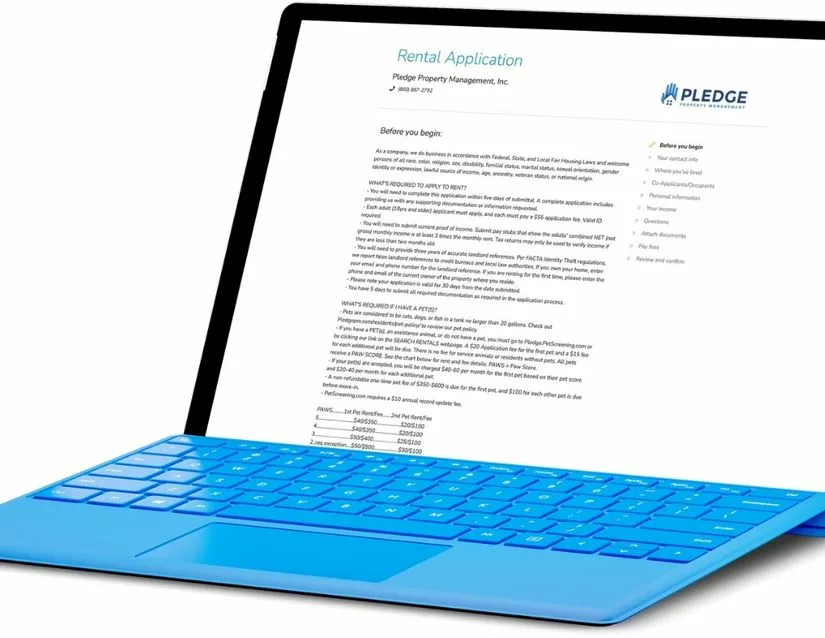Application FAQs

A: Gross income and net income are two different measures of an individual's income. Gross income is the total amount of money earned before any taxes or deductions are taken out, while net income is the amount of money an individual takes home after all taxes and deductions have been subtracted from their gross income. In the context of an apartment rental, the landlord may ask for information about your gross and/or net income to determine your ability to pay rent. Gross income provides a comprehensive picture of your financial standing, but it doesn't take into account the expenses you must pay each month. Net income provides a clearer picture of how much disposable income you have available to pay rent and other monthly expenses.
A: A tenant's credit score is an important factor that landlords consider when evaluating rental applications, but it is not the only factor. Landlords need to consider several other factors, such as income and employment, rental history, criminal background, personal references, and income-to-rent ratio, to determine if an applicant is a good fit for their rental property. Every landlord has their own criteria and priorities, and they may weigh the various factors differently.
This information was generated by an AI language model developed by OpenAI.
A: Verifiable income refers to the income that can be easily verified and confirmed by a landlord. This includes income from employment, self-employment, investments, or other sources that can be documented and confirmed through pay stubs, tax returns, bank statements, or other official records.
A: Verifiable income is important to a landlord because it provides evidence of a tenant's ability to pay the rent. Landlords want to ensure that tenants have a steady source of income and a history of making timely rent payments. By verifying the tenant's income, the landlord can have confidence that the tenant will be able to pay the rent each month. Verifiable income also helps to reduce the risk of rent defaults, evictions, and other financial difficulties that can be costly and time-consuming for landlords to manage.
This information was generated by an AI language model developed by OpenAI.
A: Yes, landlords are generally allowed to screen pets and deny them if they choose to do so. However, they must comply with fair housing laws and not discriminate against individuals with disabilities or those who require the use of an assistance animal.
A: An assistance animal, also known as a service animal or an emotional support animal, is an animal that provides a disability-related service or support for individuals with disabilities. To be considered an assistance animal, the individual must have a disability and the animal must be necessary for the individual to have an equal opportunity to use and enjoy their housing. The specific definition of an assistance animal and the criteria for determining if an animal qualifies as one can vary by jurisdiction and by specific laws, such as the Fair Housing Act.
This information was generated by an AI language model developed by OpenAI.
A: Yes, it is generally legal in Connecticut for landlords to charge pet rent or an upfront pet fee for tenants who have pets. However, the specific amount and type of fee that a landlord can charge may be subject to limitations under state or local law.
It is always important for landlords to carefully review applicable state and local laws and regulations, as well as any federal fair housing laws, before implementing any policies or fees related to pets.
This information was generated by an AI language model developed by OpenAI.
A: In Connecticut, there is a state law that sets limits on security deposits based on the age of the tenant. For tenants who are less than 62 years old, a landlord may charge up to two times the monthly rent as a security deposit. However, if the tenant is 62 years of age or older and is listed on the lease, the landlord may only charge a security deposit equal to one month's rent.
It is important to note that some cities or towns in Connecticut may have local ordinances that limit the amount of a security deposit or place restrictions on when and how a security deposit can be used.
Landlords should always be familiar with applicable state and local laws and regulations before collecting a security deposit from a tenant.
This information was generated by an AI language model developed by OpenAI.
A: Yes, it is legal for a landlord to charge a "Risk Mitigation Fee" based on a tenant's credit score in Connecticut. However, the specific terms and conditions under which a landlord may charge such a fee, as well as any limitations on the amount of the fee, may be subject to state and local laws and regulations.
It is always advisable for landlords to carefully review all applicable laws and regulations, as well as any federal fair housing laws, before implementing any fees related to a tenant's credit score or other factors.
This information was generated by an AI language model developed by OpenAI.
